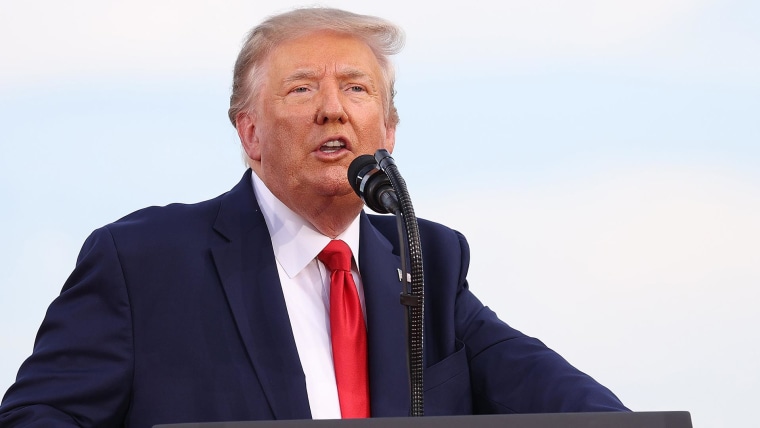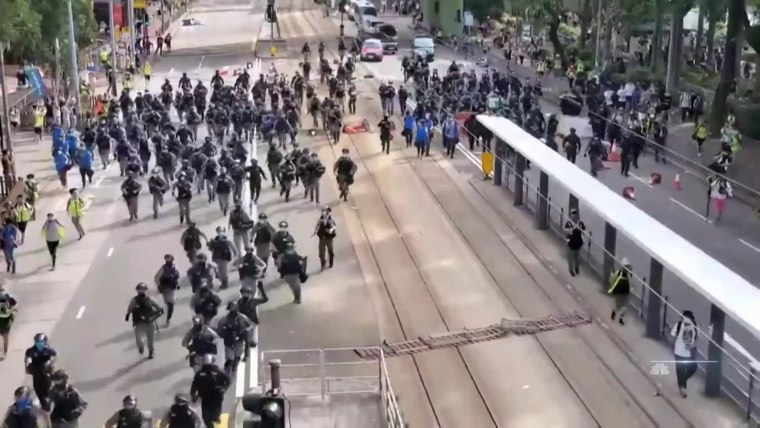WASHINGTON — The signal wasn't subtle.
While China practiced amphibious landings in a contested area of the South China Sea earlier this month, the U.S. Navy dispatched two aircraft carriers to the area "to support a free and open Indo-Pacific," the Navy said in a statement.
It's unclear how close the American and Chinese warships got to one another. But it was among the more dramatic recent illustrations of how U.S.-China relations have veered into what some experts are calling a new version of the Cold War.
Another inflection point came Tuesday. First, the British government reversed its decision and announced that equipment made by Chinese tech giant Huawei would be banned from that country's 5G networks, a blow to one of China's leading companies.
Then, President Donald Trump signed legislation and an executive order aimed at punishing China over its actions in Hong Kong, the semi-autonomous former British colony where Beijing has implemented a draconian new security law in violation of international agreements.
Also Tuesday, the U.S. Navy announced it had conducted one of its periodic "freedom of navigation" operations near the contested Spratly Islands, sending a guided missile destroyer into waters China claims as its own. It was the first such mission since Secretary of State Mike Pompeo on Monday declared China's claims to much of the disputed areas in the South China Sea "completely unlawful" and accused Beijing of "a campaign of bullying."
China slapped sanctions Monday on certain U.S. lawmakers and other American officials, in retaliation for American measures against senior Chinese officials alleged to be responsible for mass detentions, religious persecution and forced sterilization of Muslim Uighur minorities in China's Xinjiang province.
Last week, FBI director Christopher Wray issued a stark warning calling Chinese espionage "the greatest threat to our nation's information and intellectual property, and to our economic vitality."
All that came after a months-long war of words about coronavirus, in which the U.S. accused China of initially covering up the outbreak, with Trump and other officials advancing a theory that the virus may have come from a Chinese lab. A Chinese official in turn blamed the U.S. Army, and the American government accused China of trying to use hackers to steal vaccine technology.
For decades, conventional wisdom in American foreign policy held that if the West traded and engaged with China, it would gradually open up its political system and curb its rogue behavior, from extravagant maritime claims to trade protectionism to widespread intellectual property theft. But in recent years, as Chinese President Xi Jinping has doubled down on these policies in a hard-line approach, that consensus has shifted.
These days, President Trump and his Democratic rival, former Vice President Joe Biden, joust in campaign ads over who is tougher on China. And in Congress, China has few if any friends on either side of the aisle.
"We've come a long way," said Dmitri Alperovitch, chairman of the Silverado Policy Accelerator think tank, who was among the first cybersecurity experts to publicly identify Chinese state-sponsored hacking campaigns. "In a town with such deep partisan divisions, this is one issue about which there is bipartisan consensus: That China is no friend of America."
The feeling may be mutual.
China's foreign minister Wang Yi said in a speech at a Beijing think tank last week that U.S.-China relations are "faced with the most severe challenge since the establishment of diplomatic ties."
America's China policy, he added, "is based on ill-informed strategic miscalculation and is fraught with emotions and whims and McCarthyist bigotry."
Former State Department official James Lewis, who has frequently traveled to China as a cybersecurity expert and fellow at the Center for Strategic and International Studies think tank, sees the situation worsening.
"Sometime in the last five years, Xi decided it was time to displace the United States — it was time for China to be the hegemon of the world," he said. "And that just means he's going to fight with us. It's not going to be another Cold War, but it definitely will be a conflict."
The Cold War analogy doesn't quite work, experts say, because the post-World War conflict between the U.S.-led West and the Soviet Union-dominated East featured two competing political and economic systems that were self-contained and separate.
By contrast, China's economy is deeply interwoven with those of the U.S. and Western Europe through trade and investment. Chinese tourists roam the world, and hundreds of thousands of Chinese students take up residence each year at American and European universities.
But after two decades of trying to gently persuade China to follow the rules developed nations set for themselves after World War II, American policy-makers of all political stripes have concluded that gentle persuasion wasn't working.
"China does not respect the international order," said Paul Scharre, a defense expert at the Democratic-leaning Center for a New American Security. "China believes might makes right."
The U.K.'s decision to block Huawei was prompted in part, experts say, by American sanctions placed on Huawei in June limiting access to U.S. technology. Without that U.S. gear, Huawei may not be able to continue as a major 5G provider, experts say.
But Scharre notes that it comes after China's decision to tear up its agreement with Britain and crack down in Hong Kong; after a border dispute between China and India left dozens of Indian troops dead; and after Chinese attempts to coerce countries into using Huawei, he said.
"Why would you give a country like that more leverage over your critical infrastructure?"
Although Trump's administration has been tough with China on trade and security, he has not always been vocal about human rights issues. In a new book, former Trump National Security Adviser John Bolton alleges that Trump was willing to abandon his tough line in exchange for trade benefits to boost his re-election chances. Trump calls Bolton a liar.
In May, Biden accused Trump of failing to stand up to China on Hong Kong, saying Trump "has enabled Xi Jinping's sense of impunity when it comes to stifling freedom."
Several Trump campaign adds, meanwhile, accused Biden of being soft on China.
"China is one of the few things that Democrats and Republicans actually agree upon in Washington," Scharre said.
What would a new kind of Cold War look like?
The crackdown on Chinese spies in the U.S. will continue, experts say, as will economic measures to punish China for what the West perceives as international misbehavior.
The Chinese will keep building missiles and other systems to deter U.S. power projection into the Western Pacific, and the U.S. will pursue technology to counter those weapons.
And China can hurt the U.S. by failing to enforce sanctions on North Korea. Just this week, Pyongyang's ambassador to Beijing "voiced full support and solidarity" with the Chinese Communist Party and its "resistance to U.S. interference in China's internal matters, such as Hong Kong affairs," in an interview with a Chinese website.
In the wake of coronavirus-induced shortages of medical equipment, American policy-makers are already re-thinking the U.S.'s heavy reliance on manufacturing in China, including pharmaceutical ingredients.
There has also been a bipartisan push to boost government spending on areas of U.S.-China technology competition, such as artificial intelligence and quantum computing.
In June, Sen. Chuck Schumer of New York, the Democratic leader, partnered with Tom Cotton of Arkansas, one of the Senate's most conservative Republicans, on a bill to support semi-conductor manufacturing in the U.S.
"There are not a lot things that bring Tom Cotton and Chuck Schumer together," Scharre said.
"stage" - Google News
July 15, 2020 at 06:11AM
https://ift.tt/32ieUJN
As the U.S. and China spar on the world stage, Cold War 2.0 may already have begun - NBC News
"stage" - Google News
https://ift.tt/2xC8vfG
https://ift.tt/2KXEObV
Bagikan Berita Ini

















0 Response to "As the U.S. and China spar on the world stage, Cold War 2.0 may already have begun - NBC News"
Post a Comment